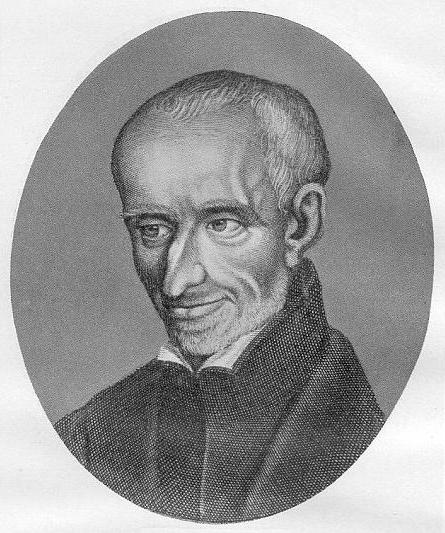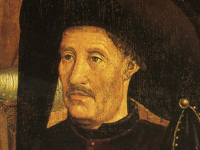
Denis Pétau (1583-1652)
On August 21, 1583, French Jesuit scholar Denis Pétau was born. Pétau, also known as Dionysius Petavius, was one of the most brilliant scholars in a learned age. Carrying on and improving the chronological labors of Joseph Justus Scaliger,[2] he published in 1627 an Opus de doctrina temporum.
Denis Pétau – Early Years
Denis Pétau was born at Orléans, where he had his initial education. He attended the University of Paris, where he successfully defended his theses for the degree of Master of Arts, not in Latin, but in Greek. After this he followed the theological lectures at the Sorbonne, and, on the advice of Nicolas Ysambert, who was appointed as first chair of theology at the Sorbonne by King Louis XIII, successfully applied for the chair of philosophy at the University of Bourges. At Paris he formed a friendship with classical scholar and philologist Isaac Casaubon, then librarian at the Bibliothèque Royale, where he spent all his spare time studying the ancient Greek manuscripts. At Orléans he was ordained deacon and presented with a canonry. In 1603 he was appointed to a lectureship at the University of Bourges, but resigned his place two years later, in order to enter the Society of Jesus in 1605. As such, he taught rhetoric at Reims (1609), La Flèche (1613), and at the Collège de Clermont (1618).
Catapathic Theology
During this last period he began a correspondence with the Bishop of Orléans, Gabriel de Laubépine (Albaspinaeus), on the first year of the primitive Church. Beginning in 1622, he taught positive theology for twenty-two years until 1644. Positive theology, or cataphatic theology is theology that uses “positive” terminology to describe or refer to the divine – specifically, God – i.e. terminology that describes or refers to what the divine is believed to be, in contrast to the “negative” terminology used in apophatic theology to indicate what it is believed the divine is not.
Dogmata Theologica
During this time he left France on only two occasions: first in 1629, to teach ecclesiastical history at Madrid at the invitation of Philip IV; second in 1639 to become a cardinal at Rome where Pope Urban VIII wanted him. At age sixty, he stopped teaching, but retained his office of librarian, in which he had succeeded Fronton du Duc in 1623, and devoted the rest of his life to his great work, the Dogmata theologica.
Improving Chronology
Carrying on and improving the chronological labors of Joseph Justus Scaliger [2], he published in 1627 an Opus de doctrina temporum, which has been often reprinted. It surpassed Scaliger’s De Emendatione temporum (Paris, 1583), and prepared the ground for the works of the Benedictines. In this work, Pétau compiled a universal history beginning in the earliest times until the year of publication, digested in a chronological order, and supported all the way by references to proper authorities. Furthermore, he popularized the usage ante Christum (Latin for “Before Christ”) to mark years prior to AD. An abridgment of this work, Rationarium temporum, was translated into French and English, and has been brought down to the year 1849.
A Prolific Writer
Pétau was a rather prolific writer. He treats of chronology, history, philosophy, polemics, patristics, and the history of dogma. His first edition of the works of Synesius appeared in 1612, undertaken ten years earlier at the advice of Casaubon; in 1613 and 1614 the Discourses of Themistius and Julian (new ed., 1630); in 1616 the Breviarium historicum Nicephori; then, after some poetical and oratorical works, an edition of Epiphanius in two volumes (1622; new ed., 1632), which had been undertaken at the advice of Jacques Gretse. In 1622 and 1623 appeared the Mastigophores, three pamphlets, and the notes dealing with Saumaise’s Tertullian, a bitter polemical work.
His paraphrase of the Psalms in Greek verse was dedicated in 1637 to Pope Urban VIII. Finally there appeared in 1643 the first three volumes of the Dogmata theologica (dated 1644), the first but unfortunately unfinished systematic attempt ever made to treat the development of Christian doctrine from the historical point of view. As a dogmatic theologian he was one of the first to accept the idea of doctrinal development and to concede the imperfections of much patristic teaching judged by later standards.
Denis Pétau died in Paris in 1652.
Graeme Dunphy, The Brill-Scaliger Lecture 2012: What is A Chronicle?, [7]
References and Further Reading:
- [1] Denis Pétau (DIONYSIUS PETAVIUS), Catholic Encyclopaedia
- [2] Scaliger and the Science of Chronology, SciHi Blog January 21. 2016.
- [3] Works of Denis Pétau, at OpenLibrary
- [4] The History of the World: or, an Account of the Time. Compiled by the Learned Dionifius Petavius. And continued by Others, To the Year of Our Lord, 1659. Together with a Geographicall Description of Europe, Asia, Africa and America.
- [5] Dionysius Petavius, Opus de Doctrina Temporum, 1627
- [6] Denis Pétau at Wikidata
- [7] Graeme Dunphy, The Brill-Scaliger Lecture 2012: What is A Chronicle?, BrillPublishing @ youtube
- [8] Herbermann, Charles, ed. (1913). “Denis Pétau“. Catholic Encyclopedia. New York: Robert Appleton Company.
- [9] Chisholm, Hugh, ed. (1911). “Petau, Denys“. Encyclopædia Britannica. Vol. 21 (11th ed.). Cambridge University Press. p. 285.
- [10] Timeline for Denis Pétau, generated via Wikidata





